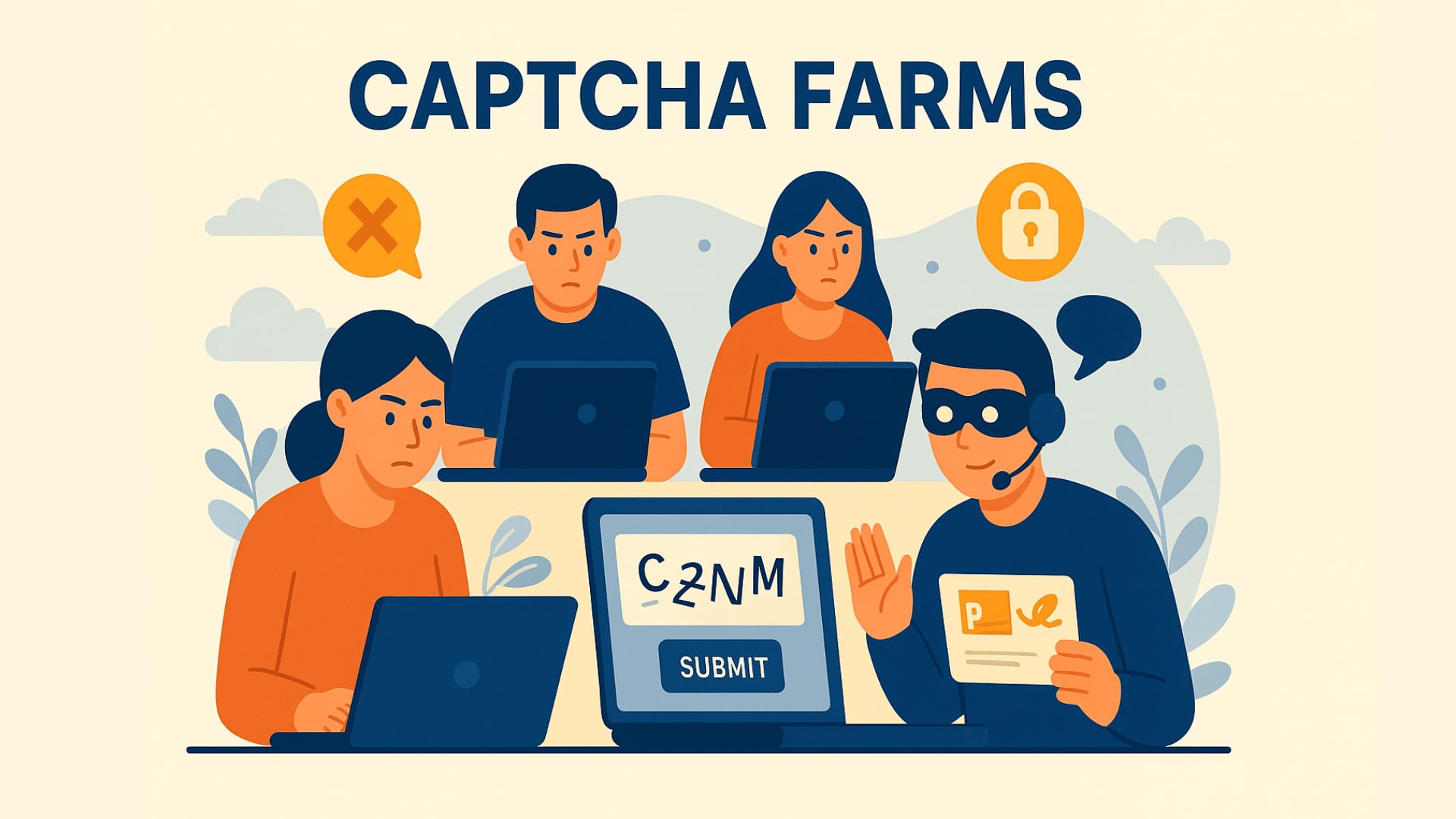
CAPTCHAs, those visual puzzles asking you to identify blurry traffic lights or distorted letters, have long stood as the frontline defense against bots. However, as digital threats evolve, even these familiar barriers are being sidestepped by increasingly sophisticated tactics. Enter CAPTCHA farms: networks of human laborers who help malicious bots bypass security challenges intended to separate real users from automated scripts.
Table of contents
Understanding CAPTCHA Farms
CAPTCHA farms are not just automated bots with better coding. Rather, they leverage real human labor to solve CAPTCHA challenges at scale. These operations rely on large pools of workers, often in low-income regions, who are paid small sums per task. Bots send CAPTCHA images through APIs, and human solvers on the other end return solutions in real time. This human-as-a-service model enables bots to sidestep even the most advanced CAPTCHA types, including animations, puzzles, and image alignment tests.
Why CAPTCHA Farms Exist
Cybercriminals find CAPTCHA farms appealing because they make automated attacks cost-effective and efficient. Rather than investing in complex machine learning models, attackers outsource CAPTCHA-solving tasks to human solvers. This enables a wide range of abusive behaviors, such as mass account creation, credential stuffing, and scraping proprietary data.
These farms function like backend services that bots call when they hit a CAPTCHA wall. The result is a streamlined system where malicious activities like bypassing account restrictions or hoarding limited-time offers can be executed at scale, with minimal technical overhead.
The Security, Legal, and Ethical Risks of CAPTCHA Farms
CAPTCHA farms compromise websites that rely on challenge-response tests to filter human users from bots. When these tests are bypassed, bots can proceed unchecked, leading to fraud, fake engagement, and data theft. The volume of malicious interactions can also degrade server performance, increasing operational costs and harming the user experience.
From a regulatory perspective, CAPTCHA farm activity can create serious compliance issues under frameworks like the GDPR and CCPA. When bots use CAPTCHA farms to access protected resources and personal data, the host platform could be found negligent for failing to implement adequate safeguards.
The ethical dimension is equally problematic. CAPTCHA farms exploit low-wage workers who often labor under poor conditions. In essence, one form of human exploitation is being used to enable another — cybercrime.
Are CAPTCHAs Still a Viable Defense?
CAPTCHAs are still useful, but traditional solutions are no longer sufficient as a standalone defense mechanism. Research shows that a significant number of CAPTCHAs are now solved either by AI or human-operated farms. As AI solvers improve, even complex visual challenges can be cracked more accurately and faster than by real users.
Increasing CAPTCHA difficulty often backfires, frustrating legitimate users while failing to block sophisticated threats. To remain effective, CAPTCHAs must advance and be part of a layered defense strategy that incorporates behavioral monitoring and risk analysis.
Detection and Prevention
Effective bot protection requires dynamic detection methods. At captcha.eu, we combine behavioral analysis, such as mouse movement, and typing cadence, with advanced anomaly detection. Our system tracks deviations in user behavior to flag suspicious patterns, even when human solvers are involved.
We also implement device fingerprinting to detect known bot configurations and outdated browsers. Through real-time threat intelligence, our platform identifies abnormal traffic spikes and regional inconsistencies, allowing us to adapt quickly to evolving threats.
As part of our GDPR-compliant and WCAG 2.2 AA certified approach, captcha.eu ensures accessibility for all users while maintaining high security standards. Our solution is designed not only to challenge bots, but to detect and block them — regardless of whether they use machine learning or outsourced labor to bypass traditional measures.
How CAPTCHA Farms Affect Real-World Scenarios
The impact of CAPTCHA farms can be felt across multiple sectors. In retail, bots empowered by human solvers manipulate inventory and pricing by purchasing high-demand items before real customers get a chance. On community platforms, fake profiles flood discussions and skew sentiment, damaging credibility.
For SaaS platforms and digital services, bots can gain unauthorized access to trial accounts, scrape competitive data, and trigger support burdens by flooding systems with invalid traffic. CAPTCHA farms make these attacks more effective by bypassing entry-level defenses that would otherwise slow them down.
Conlusion
CAPTCHA farms are an evolving threat in the cybersecurity landscape. As attackers blend automation with human assistance, defending your digital infrastructure requires more than static puzzles.
At captcha.eu, we provide a GDPR-compliant CAPTCHA service that uses advanced behavioral and anomaly detection techniques to distinguish real users from sophisticated threats. Our solution seamlessly integrates into your digital environment, offering both strong protection and a barrier-free user experience.
As bots become more capable and the human labor behind them more industrialized, only intelligent, adaptive solutions will suffice. Partner with captcha.eu to future-proof your web presence against the next generation of automated threats.
FAQ – Frequently Asked Questions
What is a CAPTCHA farm?
A CAPTCHA farm is a system where human workers — often in low-wage regions — solve CAPTCHA challenges on behalf of bots. This enables automated scripts to bypass security verifications that are meant to distinguish humans from machines.
How do CAPTCHA farms work?
When a bot encounters a CAPTCHA, it sends the challenge via an API to a CAPTCHA farm. A human worker solves it, and the answer is sent back to the bot, allowing it to continue its activity undetected.
Why are CAPTCHA farms a cybersecurity threat?
They allow malicious bots to bypass website protections, enabling activities like fake account creation, credential stuffing, data scraping, and abuse of online forms and offers.
Can CAPTCHA farms be detected?
Yes. Sophisticated bot protection systems can detect anomalies through behavioral analysis, device fingerprinting, solve speed, geo-location tracking, and signal-based risk scoring.
How does captcha.eu help protect against CAPTCHA farms?
captcha.eu offers GDPR-compliant, WCAG 2.2 AA-certified CAPTCHA solutions integrated with advanced behavioral and anomaly detection. Our platform analyses interaction patterns, deviation signals, and regional risks to identify and block both bots and human-assisted threats.
100 free requests
You have the opportunity to test and try our product with 100 free requests.
If you have any questions
Contact us
Our support team is available to assist you.




